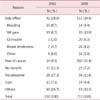Abstract
Objectives
The purpose of this survey was to compare Korean menopausal women's perceptions of hormone replacement therapy before and after publication of the Women's Health Initiative (WHI) study.
Methods
This study was conducted through a survey of 713 postmenopausal women, who attended lectures on health to commemorate Korean Menopause Awareness Month, during 2009 in Seoul and the provinces (Incheon, Daejeon, Daegu, Gwangju and Busan).
Results
Respondents' knowledge concerning the cause of menopause have been increased to 86.7% in 2009, compared to 56.6% in 2002. Women who required hormone therapy increased to 57.6% in 2009, compared to 56.6% in 2002. As a source of information about hormone therapy, media was about 34.0% in 2009, different from the previous study that doctor's advice was 60.7%. Among the women who stopped hormone therapy, the most common reason was fear of cancer (31.8%), which increased compared to 9.3% in 2002. Women who received regular screening for breast cancer increased to 82.3% in 2009, compared to 35.0% in 2002. Women who checked bone mineral density (BMD) increased to 71.8% in 2009, compared to 40.2% in 2002.
Conclusion
Menopausal women in Korea have increased their awareness of menopause. They responded that hormone therapy was helpful to manage menopausal symptoms, even after WHI study. They obtained menopause-related information through various sources, and the role of mass media has been greatly increased. But they were concerned about the increased risk for cancer, especially breast cancer.
Figures and Tables
References
1. Rossouw JE, Anderson GL, Prentice RL, LaCroix AZ, Kooperberg C, Stefanick ML, et al. Risks and benefits of estrogen plus progestin in healthy postmenopausal women: principal results From the Women's Health Initiative randomized controlled trial. JAMA. 2002. 288:321–333.
2. Beral V, Banks E, Reeves G. Evidence from randomised trials on the long-term effects of hormone replacement therapy. Lancet. 2002. 360:942–944.
3. Anderson GL, Limacher M, Assaf AR, Bassford T, Beresford SA, Black H, et al. Effects of conjugated equine estrogen in postmenopausal women with hysterectomy: the Women's Health Initiative randomized controlled trial. JAMA. 2004. 291:1701–1712.
4. Choi H, Lee HK, Park HM. The Korean menopausal women`s attitudes and awareness on menopause: results of Korean gallup epidemiologic survey on menopause and HRT. J Korean Soc Menopause. 2003. 9:36–43.
5. Deeks A, Zoungas S, Teede H. Risk perception in women: a focus on menopause. Menopause. 2008. 15:304–309.
6. MacLennan AH, Sturdee DW. WHI, WHI, WHI? Climacteric. 2004. 7:221–224.
7. Gambrell RD Jr. The women's health initiative reports in perspective: facts or fallacies? Climacteric. 2004. 7:225–228.
8. Pedersen AT, Ottesen B. Issues to debate on the Women's Health Initiative (WHI) study. Epidemiology or randomized clinical trials--time out for hormone replacement therapy studies? Hum Reprod. 2003. 18:2241–2244.
9. Heitmann C, Greiser E, Dören M. The impact of the Women's Health Initiative Randomized Controlled Trial 2002 on perceived risk communication and use of postmenopausal hormone therapy in Germany. Menopause. 2005. 12:405–411.
10. Scheid DC, Coleman MT, Hamm RM. Do perceptions of risk and quality of life affect use of hormone replacement therapy by postmenopausal women? J Am Board Fam Pract. 2003. 16:270–277.
11. Sturmberg JP, Pond DC. Impacts on clinical decision making - changing hormone therapy management after the WHI. Aust Fam Physician. 2009. 38:249–251. 253–255.




 PDF
PDF ePub
ePub Citation
Citation Print
Print










 XML Download
XML Download